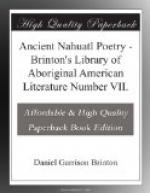yhuintia, causative form of ihuinti, to make drunk. The Nirvana of the Nahuas was for the soul to lie in dense smoke and darkness, filled with utter content, and free from all impressions ("en lo profundo de contento y obscuridad,” Tezozomoc, Cronica Mexicana, cap. 55).
NOTES FOR SONG II.
On the signification of the titles given to this poem see the Introduction, Sec. 3.
1. yehnan Dios; literally “who are God;” the introduction of the Spanish Dios, God, is in explanation of in tloque in nahuaque; so far from proving that this song is of late date, this vouches for its genuine ancient character, through the necessity for such explanation.
2. nelhuayotl, the essence or source of something, its true nature; probably from nelli, true.
teoquecholme; the prefix teotl, divine, is often added as an expression of admiration. Sahagun mentions the teoquechol as a bird of brilliant plumage.
NOTES FOR SONG III.
The poet recalls a recent attendance on the obsequies of an acquaintance, and seeks to divert his mind from the gloomy contemplation of death and the ephemeral character of mortal joys by urging his friend to join in the pleasure of the hour, and by suggesting the probability of an after life.
1. xochicalco; compounded of xochitl, flower; calli, house; and the postposition, co. The term was applied to any room decorated with flowers; here, to the mortuary chamber, which Tezozomoc tells us was decked with roses and brilliant feathers.
ipalnemohuani, literally “the one by whom life exists.” The composition is i, possessive pronoun, third person, singular; pal, postposition, by; nemoani, singular of the present in ni of the impersonal form of the verb nemi, to live, with the meaning to do habitually that which the verb expresses. It is an ancient epithet applied to the highest divinity, and is found in the Codex Telleriano-Remensis, Kingsborough’s Mexico, Vol. VI, p. 128, note.
tolquatectitlan, from toloa, to lower, to bow; quatequia, to immerse the head; tlan, place ending. In the ancient funeral ceremonies the faces of the assistants were laved with holy water. On this rite see the note of Orozco y Berra to his edition of the Cronica Mexicana of Tezozomoc, p. 435 (Mexico, 1878).
xoyacaltitlan; from xoyaui, to spoil, to decay, whence xoyauhqui, rank, unpleasant, like the odor of decaying substances.
xochicopal tlenamactli, “the incense of sweet copal,” which was burned in the funeral chamber (see Tezozomoc’s description of the obsequies of Axayaca, Cron. Mex., cap. 55).
2. The translation of this verse offers some special difficulties.




